

PUBLIC SECTOR STRATEGY NETWORK: 2023 ANNUAL FORESIGHT RETREAT
THIS PROGRAM WAS MADE POSSIBLE THROUGH THE GENEROUS SUPPORT OF:

SALZBURG GLOBAL SEMINAR IS ALSO GRATEFUL TO OUR PROGRAM PARTNER:

SALZBURG GLOBAL SEMINAR WOULD LIKE TO THANK ALL PARTICIPANTS FOR DONATING THEIR TIME AND EXPERTISE TO THIS PROGRAM.

PUBLIC SECTOR STRATEGY NETWORK
2023 ANNUAL FORESIGHT RETREAT
MAY 22 TO 24, 2023
Session 802-01
RAPPORTEUR
Derek Alton
PROGRAM DIRECTOR Charles E. Ehrlich
Contributors Audrey Plimton and Namrata Bhandari
Editor Aurore Heugas
Photos Katrin Kerschbaumer
Cover Image Shutterstock
PROGRAM MANAGER Kateryna Anselmi
3
4 Public Sector Strategy Network: 2023 Annual Strategic Foresight Retreat CONTENTS 5 Program Overview 6 Introduction 7 Trust in Government and Service Delivery 8 Another World is Possible - Playing with Imagination 8 Doing a Deep Dive into the UK - A Country in Turmoil 9 State of Finance and Budgeting Innovations 10 AI Governance Models 10 Citizen Engagement - Estonia 2035 10 The Future of Work 11 Expanding our Thinking on Design 11 Imagining the Government of 2040 11 Behavioral Insights and Mindful Leadership 12 Middle East Leadership and the Role of Middle Management 12 Statistics and Policy Making 13 Interviews With Network Members 19 Conclusion: Navigating the New Normal in Government Adapting to a World of Interlinked Crises The Challenge of Reactive Policymaking Strategic Foresight as a Tool for Resilience Leveraging Collective Wisdom and Diverse Perspectives Holistic Approaches to Complex Problems Looking Forward to 2024 20 Participants
PROGRAM OVERVIEW
The COVID-19 pandemic forced governments to narrow their focus on an immediate crisis. However, long-term challenges remain. Climate change, economic chaos, migration, and new technologies are causing political and social disruptions that impact the future of education, work, health, and even the fundamental structure of the state itself. What new expectations do citizens have for the respective roles of public, private, and civil sectors, and for local community vs. national-level governance? What skills and ideas do public servants need in order to design the future? What opportunities for transformative policy and leadership have arisen following these global disruptions?
The annual invitation-only retreat of the Public Sector Strategy Network enables senior public sector leaders to speak openly among peers about major disruptive forces confronting governments. To respond and plan effectively and to have concrete lessons to share within their respective leadership structures, participants can compare experiences in off-the-record conversations as to how their respective departments and institutions are addressing these challenges.
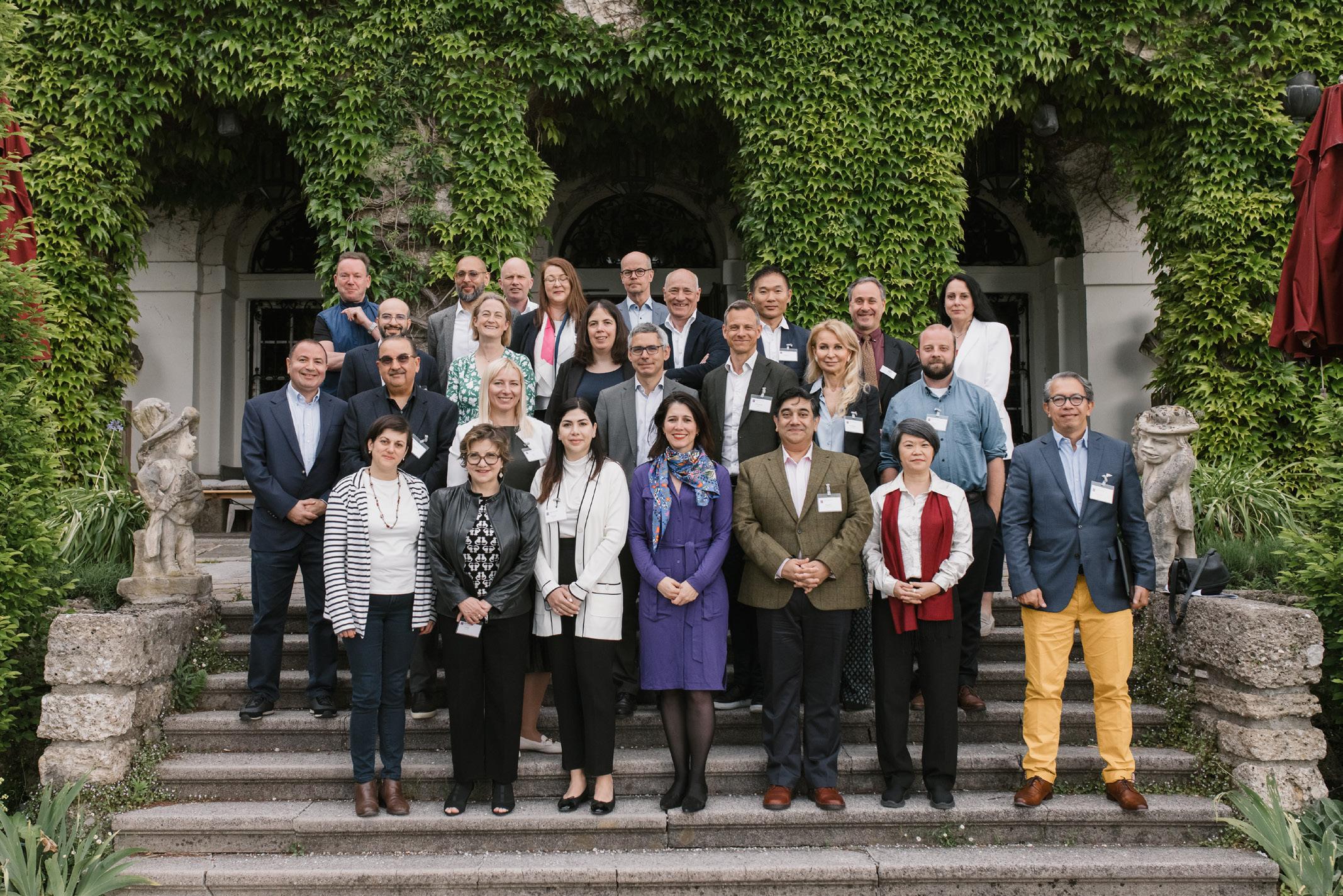
5
INTRODUCTION
The Public Sector Strategy Network’s Annual Foresight Retreat, held in 2023 at Salzburg Global Seminar, was a pivotal gathering of senior public service leaders from around the globe. This report synthesizes the rich discussions and insights from the three-day event, which focused on the evolving dynamics of public service, the crisis of trust in government, the critical role of middle management, and the imaginative envisioning of the future of government.
The retreat’s serene setting amidst the Austrian mountains provided a conducive backdrop for reflective and strategic dialogues. Participants engaged in a comprehensive exploration of current challenges and future opportunities in public service, emphasizing the importance of trust, effective service delivery, and innovative governance.
Trust in Government and Service Delivery : A central theme was the crisis of trust in government, exacerbated by volatility in service delivery. Discussions highlighted that public trust is rooted in the government’s ability to deliver on its promises. The indifference of the public towards the identity of the service provider, as long as services are delivered effectively, was a notable insight, underscoring the need for efficiency and reliability in public services.
The Middle Management Squeeze: The retreat brought attention to the often underappreciated and challenging role of middle managers in the public sector. Sometimes termed the “clay layer,” these individuals are crucial in bridging the gap between strategy and execution and translating
across generational and cultural divides. The discussions underscored the need for better support and recognition of middle management, highlighting their role in fostering innovation and preventing talent drain.
Imagining the Future of Government: Looking towards 2040, the retreat envisioned a government that acts more as a facilitator and ecosystem builder than a mere service provider. Anticipated challenges such as climate change, increased polarization, and ethical dilemmas around emerging tech like AI and genetic modification were discussed. The emergence of new roles, including AI experts and advocates for nature, was highlighted as a key aspect of this future vision.
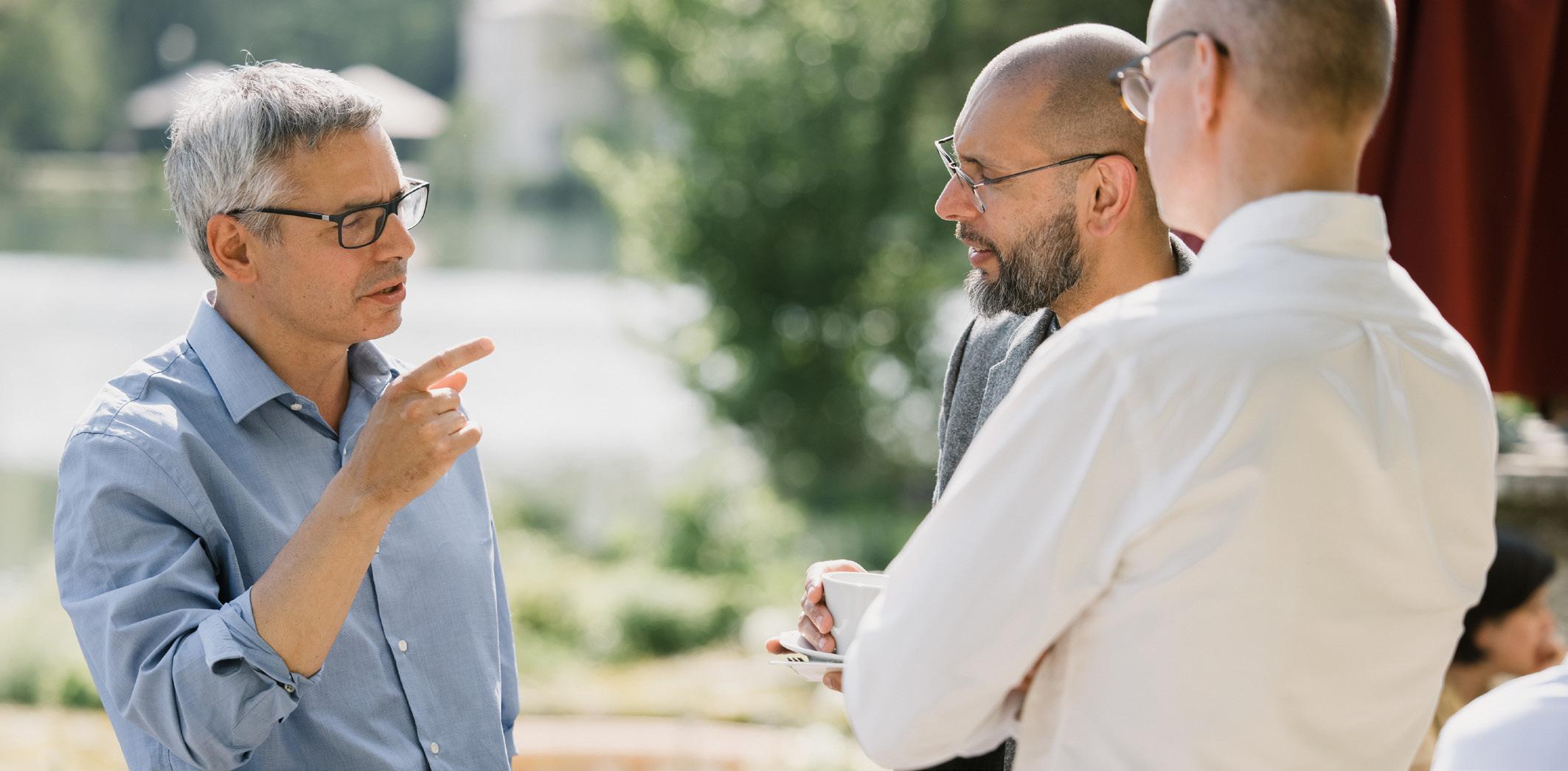
6 Public Sector Strategy Network: 2023 Annual Strategic Foresight Retreat
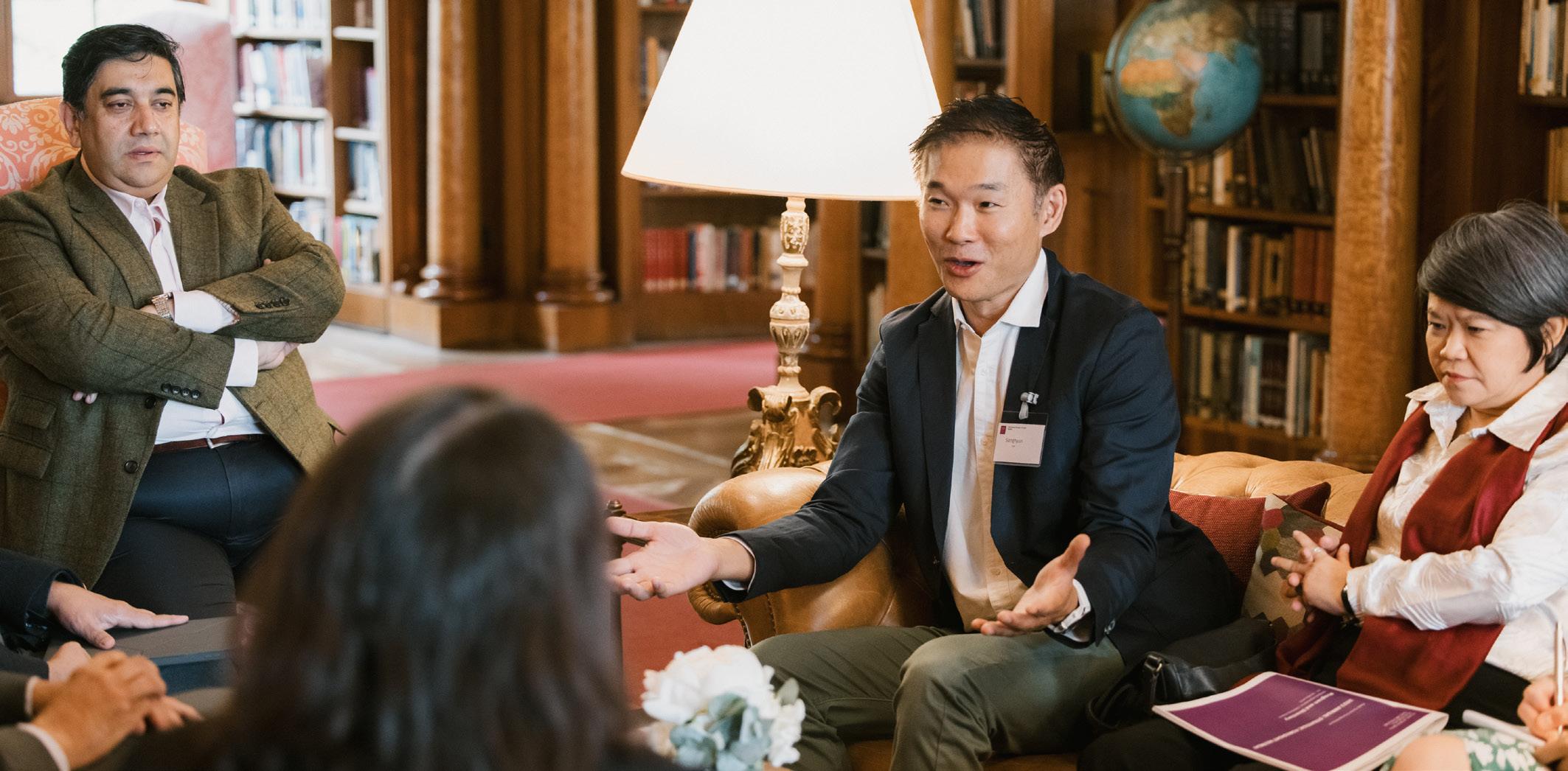
Key Highlights and Insights: The retreat was marked by rich discussions on various topics, including the importance of designing for trust, the crisis of imagination in government, financial sustainability, AI governance models, and innovative community engagement practices. The evolution of mega-cities, the impact of AI on the job market, and the role of middle management in strategy execution were also key topics of discussion.
In total, the 2023 Annual Foresight Retreat underscored the urgent need for innovative thinking and policymaking in government. It emphasized the importance of building trust, supporting middle management, and proactively preparing for the complex challenges of the future. This report aims to capture the essence of these discussions and serve as a guide for futureoriented public service leadership.
The Annual Foresight Retreat is held under the Chatham House Rule, which has been adhered to in this report, with all attribution provided with approval.
TRUST IN GOVERNMENT AND SERVICE DELIVERY
From the start, trust in government became a central theme.
We visited a design company that challenged us to focus on the concept of designing for trust, particularly
in the context of government services. The key theme was “Design for Desire,” which involves creating brand experiences that add meaning and emotional attachment to products. This approach emphasizes understanding the value of things not just in terms of functionality but also in terms of the emotional connection they foster. The discussion highlighted the importance of understanding the market through firsthand experiences, suggesting a shift towards citizen-centered design in government services. A critical question raised was about the target audience for design - if governments can’t design for everyone, who should they prioritize, and what implications does this have? The session underscored that trust in government is fundamentally about promise and delivery, with the digital age amplifying the impact of immediate public feedback through reviews and social media. This emphasizes the need for governments to deliver on their promises consistently to maintain and build trust with the public.
APOLITICAL RESOURCES
• (Video) Rebuilding trust in government in painful and turbulent times
• (Video) How to earn trust and avoid distrust in the public service
• Here’s how little we trust our government and the implications for us all
• “Trust me, I work for the government”
7
ANOTHER WORLD IS POSSIBLE - PLAYING WITH IMAGINATION
Crisis of Imagination and Trust in Government: This theme addressed the challenge in envisioning a better society and government, underscoring a significant decline in trust in government at a time when it is most needed. The shift in cultural narratives from utopian to dystopian visions since the 60s and 70s was discussed, highlighting how simple yet impactful ideas, such as the circular economy, can be more influential than complex narratives.
The Concept of Government of the Future: The session explored the potential for a transformative vision of future governments. This vision includes roles dedicated to advocating for nature and future generations. The importance of integrating an intelligence function within government operations was emphasized, similar to the role played by finance departments, but with a focus on incorporating citizen insights. The innovation labs of the United Nations Development Programme (UNDP) were mentioned as an example. The need for a complete overhaul in public finance was also discussed, advocating for treating investments in people as long-term infrastructure and employing better measures for assessing the impact of investments.
Institutional Innovation and Architecture: The need for new institutional architectures to effectively address contemporary challenges was a key focus. The session noted that many current government structures are based on models from the 40s and 50s and are now outdated. Examples of innovative institutional designs were discussed, such as Estonia’s X-Road system, the proposal for a citylevel institution to manage energy data, a state-level mental health institution in Victoria, and the concept of a global AI regulator. The emphasis was on the necessity of being both imaginative and practical in creating new institutions to meet the demands of the present and future.
For more on imagination and government, check out “Another World is Possible” by Geoff Mulgan.
APOLITICAL RESOURCES
• (Video) How to fuel imagination in government
• (Video) Imagining the future of government
• What would the open data utopia actually look like?
• How to drive transformative collaboration in the public sector
• The imagination problem in public technology
DOING A DEEP DIVE INTO THE UK - A COUNTRY IN TURMOIL
One of the case studies explored in great depth the recent political and economic turmoil in the UK, which has significantly impacted policy continuity and public service stability. The country has experienced high vacancy rates and a notable exodus of personnel, with police recruitment being a notable exception. The upcoming election is expected to focus heavily on the cost of living, underlining the importance of consistency in policy-making. The post-Brexit era has brought new responsibilities and pressures as the UK reclaims roles previously managed by the EU.
The brief tenure of Prime Minister Liz Truss was discussed as a potential example of strong institutional responses influencing political outcomes. The movement of public servants was a key topic, with excessive mobility seen as leading to service delivery issues and eroding trust in partnerships.
However, it was also recognized that this mobility can facilitate the spread of ideas and skills where they are most needed. This movement has been institutionalized through incentives for career progression within the public service.
APOLITICAL RESOURCES
• Insights from the field: UK Gov Camp edition
• Minnesota’s rural towns are fighting brain drain by rebranding
• The brain behind Brexit has a message for public servants
8 Public Sector Strategy Network: 2023 Annual Strategic Foresight Retreat
STATE OF FINANCE AND BUDGETING INNOVATIONS
A significant focus of the day was on the financial challenges and innovations in public sector budgeting:
• Global Financial Trends: The growing concern over countries spending beyond their means was highlighted, with increasing national debts becoming a universal issue. The session explored the shift from performance budgeting to outcomebased budgeting as a potential solution.
• Innovative Budgeting Practices: Examples of “Green Budgeting” and “Wellbeing Budgeting”, as practised in countries like New Zealand, were discussed. The emergence of gender budgeting as a growing trend was also noted.
APOLITICAL RESOURCES
• Making your city budget a lever for transformation
• Portugal has announced the world’s first nationwide participatory budget
• To budget for equity, cities first must define equity
• Data-driven equity and climate budgeting
• Why gender budgeting needs to be present in COVID-19 policy responses
• A new framework for funding the future
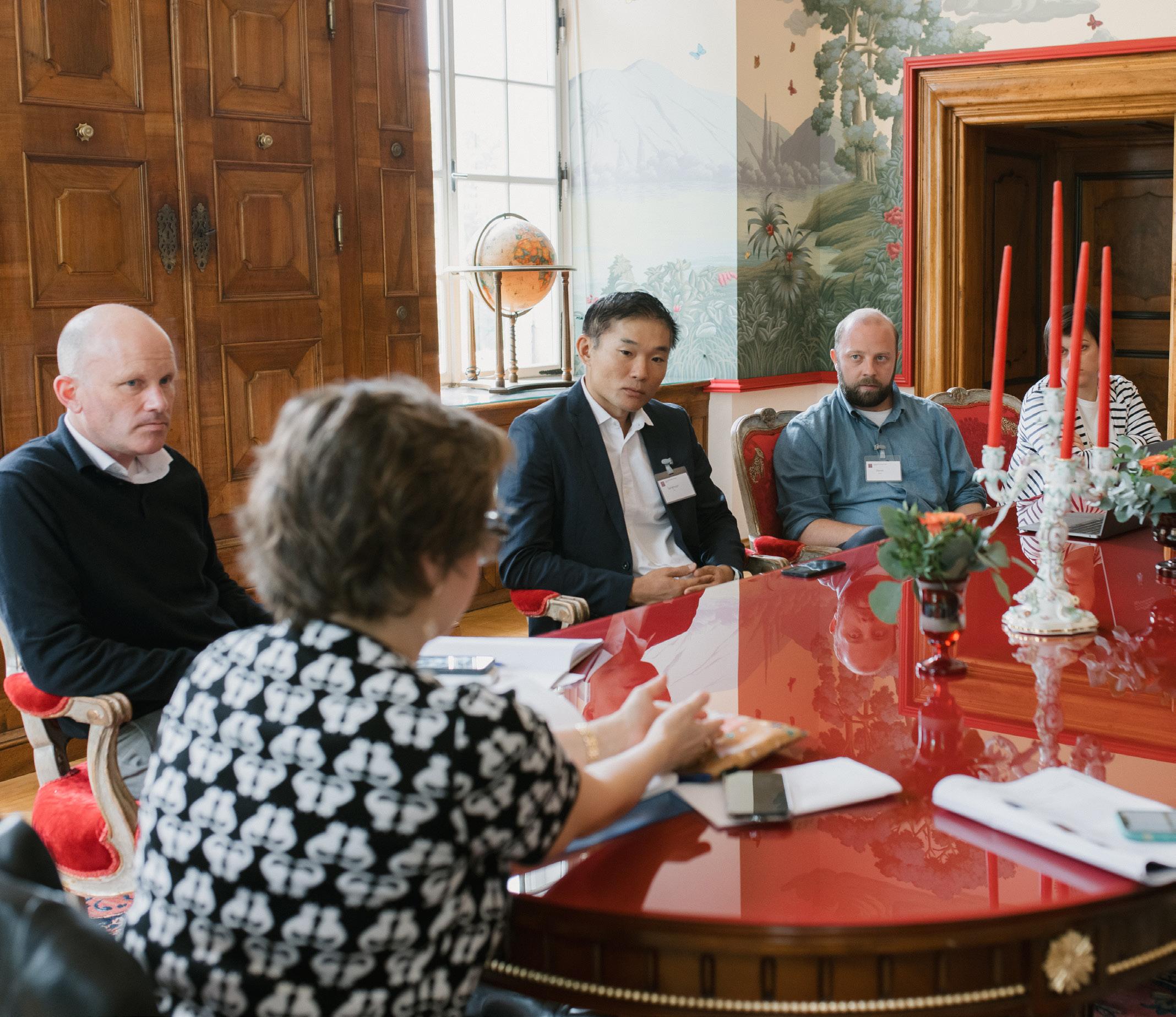
9
AI GOVERNANCE MODELS
AI, of course, played a key role throughout the retreat. In particular, we explored two contemporary frameworks that can serve as guideposts, the European AI Act and USA AI Bill of Rights:
• Europe’s AI Act categorizes AI into four levels: Forbidden, High Risk, Middle Risk, and Low Risk, establishing a regulatory framework based on the risk profile of AI applications.
• The USA’s framework for an AI Bill of Rights focuses on ensuring safe and effective AI systems, providing protections against algorithmic discrimination, and emphasizing the importance of data privacy.
APOLITICAL RESOURCES
• Government AI Campus
- (Video) How to use AI tools in your work in government
- (Course) Understand How AI Impacts You and Your Government
• How AI empowers citizens to take an active role in the energy transition
• How to manage AI procurement in public administration
CITIZEN ENGAGEMENT - ESTONIA 2035
Estonia’s approach to citizen engagement, as part of their “Estonia 2035” strategic plan, emphasized broad engagement and transparency. Efforts to involve a wider public beyond civil society organizations included online surveys and collaborations with public libraries, yielding diverse responses. A notable initiative was the Youth Opinion Journey, a gamified process aimed at engaging young people by allowing them to explore different roles and understand the consequences of their choices. Although initial participation was limited due to busy schedules, especially among teachers, the project gained more traction post-pandemic.
Key lessons from Estonia’s experience include the importance of design thinking, pilot testing, managing expectations, building trust, finding reliable partners, and adapting methods to reach various audiences. The
approach demonstrated that effective engagement doesn’t necessarily require large budgets but does require agility and a willingness to adapt strategies
APOLITICAL RESOURCES
• 8 principles for citizen engagement
• (Video) How to put citizen engagement into practice in government
• The pitfalls of citizen engagement
• (Video) Mastering public engagement for effective policymaking
THE FUTURE OF WORK
The pandemic and rise of AI have led to seismic shifts in work around the world. This became a central theme throughout the retreat.
• Major Influences on Work: The future of work is being shaped by COVID-19, climate change, demographic changes, budgetary constraints, and generative AI. Key developments include the rise of remote work, discussions around work-life balance reforms like Canada’s remote work rights and France’s 4-day work week, and the impact of these changes on office dynamics and employee relationships.
• Generative AI and Employment: AI is predicted to cause a net 2% job loss, according to the World Economic Forum, with significant implications for gender inequality and global economic disparities. This technological shift necessitates governance focused on equitable outcomes and the mitigation of biases.
• Policy and Governance Challenges: The discussions emphasized the need for proactive governance in managing the workforce transition, highlighting the importance of upskilling, continuous learning, and adapting to new job requirements. The role of governments is seen as crucial in steering these changes, with policies like guaranteed annual income and skill development strategies being key considerations.
• Workforce Dynamics and Government Role: Current trends show a skills gap in the West, with less concern about AI-induced unemployment but more focus on addressing the mismatch
10 Public Sector Strategy Network: 2023 Annual Strategic Foresight Retreat
between existing skills and new job requirements. Governments are tasked with facilitating strategies to manage these shifts, ensuring meaningful work opportunities, and considering diverse impacts across generations and regions.
APOLITICAL RESOURCES
• (Q&A) Which government-initiated, future-of-work innovations have had the biggest impact?
• (Course) The Future of Work
• Reasons to be cheerful about the future of work
• Future of work: 5 ways to “build back better” after COVID-19
EXPANDING OUR THINKING ON DESIGN
Trust and Effective Service Delivery: This theme underscores the importance of building trust in government through the effective delivery of services. It challenges the traditional boundaries of design and problem-solving in public services, advocating for innovative approaches to meet evolving public expectations.
Expanding Thinking in Several Key Areas:
• Time: Emphasizes the need for a long-term perspective in planning and decision-making, suggesting inspiration from science fiction to envision diverse futures.
• Proximity: Highlights the importance of empathy in governance, advocating for a blend of sensory experiences and cognitive understanding to drive impactful actions.
• Life: Encourages deeper contemplation about the meaning and value of life in today’s world, questioning conventional life metrics.
• Value: Proposes moving beyond traditional economic indicators like GDP to assess societal well-being and success, reflecting on broader value systems.
• Roles: Examines the changing roles of individuals in governance and society, with a focus on ethical considerations and evolving responsibilities.
• Sectors: Stresses the importance of cross-sector collaboration, noting the increasing role of businesses in societal impact and the concept of “Mission Managers” for fostering ecosystem thinking.
• Organization: Suggests a potential expansion in thinking about organizational structures, questioning what types of innovative and adaptive institutions are needed to foster human creativity and productivity for a just and equitable transition.
Overall, these themes advocate for a more expansive and holistic approach to design in public service and governance, encouraging a break from traditional methods and a move towards a more inclusive, futureoriented perspective.
For more on expanding design thinking, check out “Expand” by Christian Bason.
APOLITICAL RESOURCES
• Service design thinking — how to design public services
• How design thinking changes lives
• (Video) Why strategic thinking in government matters
IMAGINING THE GOVERNMENT OF 2040
Government as a Facilitator and Ecosystem Builder: The future government was imagined as a facilitator and ecosystem builder rather than just a service provider. This shift emphasizes the government’s role in nurturing networks and fostering collaboration.
New Government Roles: The discussion envisioned new roles within the government, such as AI advisors, biomimicry experts, and advocates for nature. These roles reflect the evolving challenges and opportunities in governance.
BEHAVIORAL INSIGHTS AND MINDFUL LEADERSHIP
Behavioural Insights in Strategy and Planning: The use of behavioural insights to understand and influence public behaviour was discussed. The importance of narrative in complementing data and evidence was highlighted.
11
Mindful Leadership: The session on mindful leadership emphasized the need for leaders to be present, responsive, and emotionally intelligent. The discussion explored how mindfulness can help leaders navigate complex and volatile environments.
MIDDLE EAST LEADERSHIP AND THE ROLE OF MIDDLE MANAGEMENT
Insights into leadership practices and challenges in the Middle East were shared:
• Visionary Leadership in the Middle East: The adoption of national visions by Middle Eastern countries was discussed. These visions represent a commitment to societal improvement and are crucial for guiding future policies and initiatives.
• The Critical Role of Middle Management: The importance of middle management as a link between strategy and execution was emphasized. The discussion highlighted the need for supporting and empowering middle managers to effectively translate vision into action.
STATISTICS AND POLICY MAKING
Responsive and Relevant Statistics: The need for statistics to be responsive, inclusive, local, and relevant was underscored. Examples included real-time data during the COVID-19 pandemic and embedding statisticians in local decision-making processes.
APOLITICAL RESOURCES
• Introducing a “Government as a System” toolkit
• (Video) Imagining the future of government
• Seven behavioural insights tips from pioneering cities
• Behavioural insights reading list: the best podcasts, reports, books
• Leaders, how’s your emotional quotient?
• Making public policy more inclusive

12 Public Sector Strategy Network: 2023 Annual Strategic Foresight Retreat
INTERVIEWS WITH NETWORK MEMBERS
By Audrey Plimpton and Namrata Bhandari, Salzburg Global seminar
DESIGNING A BETTER FUTURE: THE INTERSECTION OF DESIGN, POLICY, AND SOCIETAL TRANSFORMATION
Christian Bason discusses the power of design in shaping society and driving systemic change
This interview has been edited for length and clarity.
Audrey Plimpton, Salzburg Global Communications Associate: How can design be used to shape a society in meaningful and positive ways?
Christian Bason, CEO of the Danish Design Center: Once you get to know the field of design, you see the world through that lens [and realize that] everything around us is the result of human design. In this way, design is an expression of what we want to do with the world to meet our needs [and] to shape the world in ways that are meaningful to us. Then the question becomes: What is a good world? What is a good society? What do we need to design to make it better? Bringing the mindset, thinking, tools, approaches, [and] profession of design as a human, systematic, creative approach to our world is incredibly powerful. But without purpose, values, direction, [and] vision, design by itself is nothing. It’s only something if we are purposeful about what we want to change.
AP: What inspired you to push the boundaries of the design field into the domains of policy innovation and governance?
CB: Those are domains that are incredibly relevant to design because policymaking is essentially a design activity. It’s asking what shape society should take and what interventions we can make on behalf of a society or government to achieve our goals. There’s a huge potential to bring design into policymaking, into public management, into how we deliver services, and so on. For me, the big challenge now is that as problems become more complex, turbulent,
and wicked, we have an urgent need to drive the big transitions in the world: the green transition, the social transition, and the transition to meaningful human use of digital technology. In these big transitions, the question is: How do we position design there, and how do we design for long-term systemic change? The questions we ask are: How do you mobilize people around preferred futures? How do we see a shared image of the long-term future that is concrete, that comes alive, that is human, that embraces nature, and that tells us stories about where we want to go? After we have mobilized, understood the preferred future, painted those pictures, [and] told the stories, we can ask questions about the capacities we need in public service and public administration, but also the capacities we need in other sectors of society, [such as] business, civil society, and academia. The bottom line is to design the long-term impact that we want… The big questions around transition design are where I want to devote my professional life.
AP: What is “expansive thinking”, as your book Expand: Stretching the Future By Design describes, and how can public sector leaders work towards this mindset?
CB: As problems accelerate, expand, and become more complex, we need to expand the way we think and explicitly bring our thinking into design thinking. For public managers and policymakers, the challenge is to ask: What timeframe are you designing policy for? What sectors are you engaging with? What is your sense of proximity and closeness to the people you are serving, and to nature [and] every living thing that you need to take into account as you decide policies? What value do you want to generate… are
13
you aware of broader value [regarding] democratic, social, environmental, climate, [and] trust? The “Expand” framework becomes an inspirational source, but also a challenge for leaders to take a step back and ask new questions in the process of designing and decision-making.
AP: What did you gain from your exchanges with public sector leaders during this program?
CB: Being in this unique setting [that is] beautiful, historic, and embedded with stories and values, you feel like you are in a neutral space to be inspired, to learn, and to open your eyes to a diversity of perspectives. From the people that I’ve engaged with over the last few days, I think what really strikes me is the diversity of views that challenge my own assumptions. It’s striking how generous people are with their knowledge and wisdom. Whenever someone says something, it’s worth listening to… There’s a sense of being with people who are
genuinely interested in sharing and who are also open and curious to learn, as I hope I am. That’s a rare thing and it’s worth investing time in.
AP: What is something that surprised you during this program?
CB: One takeaway from the last three days is a sense of confusion and not seeing clearly what the future holds, a sense of humility about that, [and] a sense that things are breaking or falling apart to some extent. At the same time, [there is] hope that good people in and out of the government can make a difference. Behind the confusion and frustration and despair, I see hope and a recognition of agency. I think the key, both at the individual level and at the collective level, is to find good ways to act collectively to drive the big transitions forward.
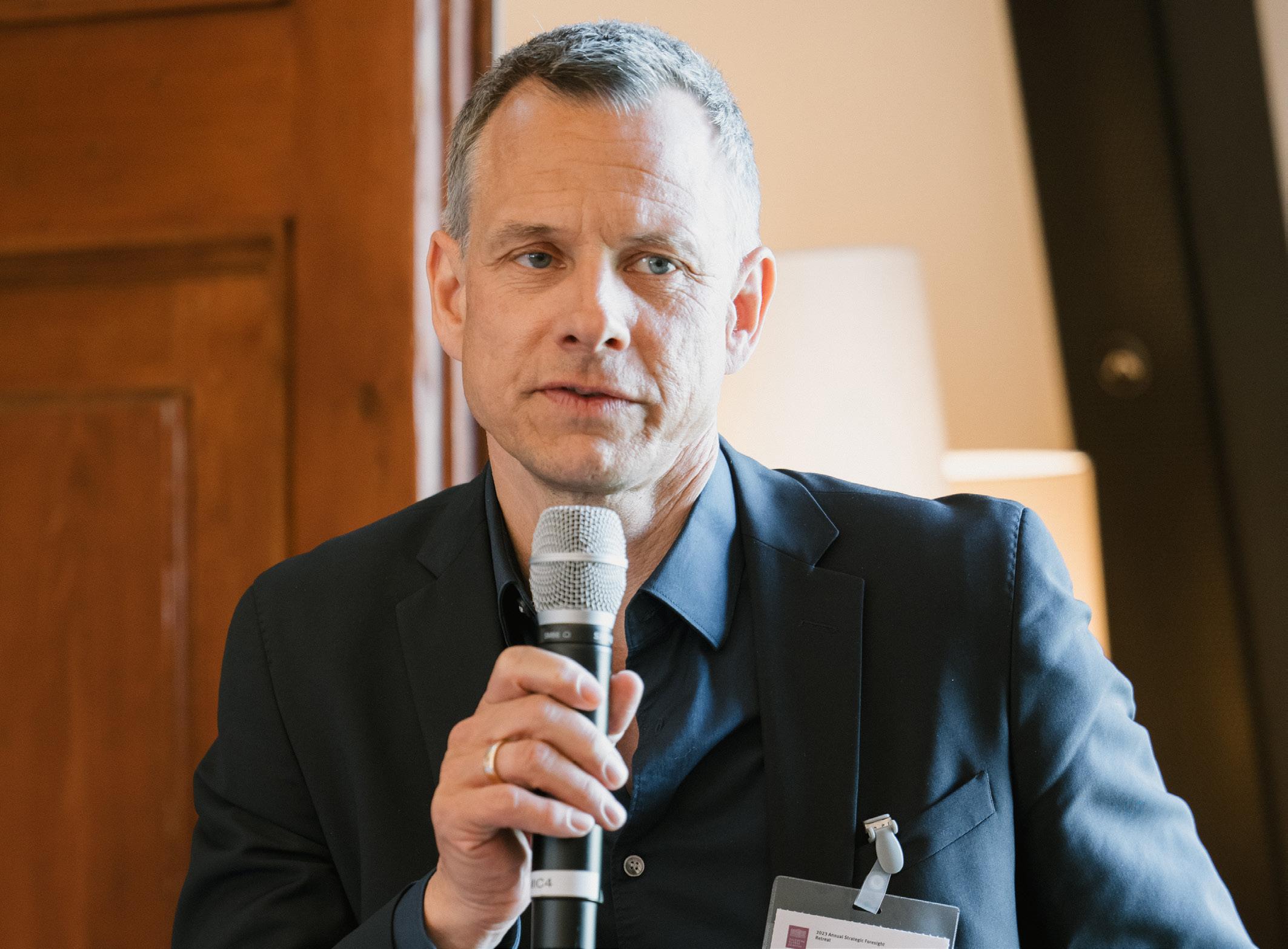
14 Public Sector Strategy Network: 2023 Annual Strategic Foresight Retreat
Christian Bason
BEHAVIORAL INSIGHTS: APPROACHING POLICY BY UNDERSTANDING HUMAN BEHAVIOR
Faisal Naru delves into how observing human behavior can optimize policy and the significance of convening
This interview has been edited for length and clarity.
Namrata Bhandari, Salzburg Global Communications Intern: How would you introduce yourself and describe your work?
Faisal Naru, Founder and Director of Think Test Do: I would introduce myself as somebody who is passionate about understanding why people do what they do and trying to find solutions to complex problems, and that’s largely been the theme in my career.
NB: Can you reflect on any significant experiences that have affected how you lead?
FN: The most meaningful experiences that you have are those experiences that you have witnessed yourself. Unfortunately, we know through behavioral science that we remember harm more clearly than we remember good. I have learned more from witnessing bad leadership as compared to good leadership. That is a normal thing that happens among people. The other side of this, which is probably more positive, is that you can use this to focus on creating an environment for growth, a mindset of learning, enabling a good environment for your staff and trusting them. The significant experiences that I have had in trialing and testing those have been positive, and that has been very reaffirming about trusting people, empowering them, and letting them grow and develop.
NB: How would you explain behavioral insights to someone who is unfamiliar with the term?
FN: I would describe behavioral insights in two ways. A very simplistic way of describing it would be that it seeks to understand why people do things and behave in certain ways. But there is a more technical aspect to it, the way that it has spread across the world, particularly in public policy, and given rise to the behavioral public policy movement. Firstly,
it leverages a wealth of knowledge, the wealth of the social sciences, cognitive sciences, decisionmaking, and design thinking. So, it has empirical foundations. Secondly, it introduces and tries to mainstream the notion of experimentation in public policy. Thirdly, it applies the inductive approach to problem-solving, which essentially starts with no assumptions, and no hypothesis and attempts to induce results and find out what’s going on. Instead, you start with a blank slate.
NB: How would you use behavioral insights to affect policymaking and public policy?
FN: One of the most powerful uses of behavioral insights in public policy is in diagnosis and truly understanding what is going on. Why are people behaving in a certain way? Why aren’t they doing what we want them to do? Why are they not recycling? Why are they speeding on the roads? Why? You keep asking the question “why” to try and find out the cause of the behavior. Behavioral insights can also be used for policy evaluation, which is closely linked to diagnosis.
NB: What do you hope to learn from the 2023 Annual Strategic Foresight Retreat and the Fellows attending it?
FN: I want to understand where people are at. We are all dealing with similar issues, but you rarely get the chance to sit and interact with peers from the field. It’s compelling to sit down and brainstorm and share notes on what is working or what is not working, which direction we are going in, or what the most significant challenges are. There are those kinds of rich conversations that you can’t have elsewhere but can certainly have in this type of environment. It’s a luxury to be able to spend time with all these fantastic Fellows and to be able to try and come up with ideas so that when we all depart, we have a fresh impetus, which can be quite challenging when you’re dealing with these complex problems. You form connections
15
with people, which hopefully means that you can rely on them, and you reinvigorate your motivation to do what you love to do, which is helping people and improving governance.
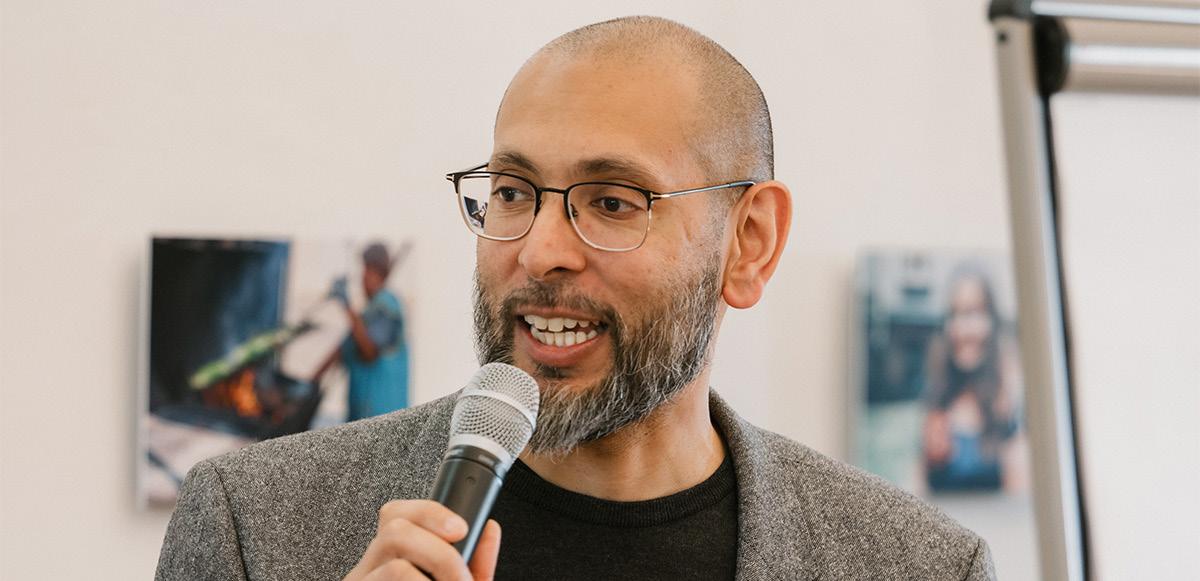
BUILDING BRIDGES: COLLABORATION BETWEEN PUBLIC AND PRIVATE SECTORS FOR SUSTAINABLE URBAN DEVELOPMENT
Bernardus Djonoputro elaborates on how the public-private partnership can foster sustainable urbanization in the Global South and worldwide
This interview has been edited for length and clarity.
Audrey Plimpton, Salzburg Global Communications Associate: How do you think the private sector can contribute to the public sector and vice versa?
Bernardus Djonoputro, CEO of the Rebana Metropolitan Management Authority: The government today has a complex task of planning, developing, and building the right infrastructure to keep up with urbanization… especially in the Global South where we see rural areas transforming into urban [areas] and the rapid development of urban society. By the end of this century, 85% of people in the world will be living in urban areas… in the next few years [until 2030], 5 billion people will be living in cities. How to manage the organization of this is a challenge for every government in the world. We face the challenge of not only coming up
with the right policies and infrastructure but also how to finance all of it. This is where the private sector and governments need to look at the whole equation. We’ve seen public finance initiatives in the world… but we also see countries that weren’t very successful in getting private participation and the provision of needed infrastructure in cities.
AP: What are some challenges facing the AsiaPacific region?
BD: I think it is important to look at the future as an issue for the new regions of the Asia-Pacific, where a lot of what we’re talking about today is happening. I’m referring to the challenge of coping with urbanization and taking advantage of productive urbanization which is happening in the Global South. This transformation requires a lot of resources and working together. I think the cumulative knowledge
16 Public Sector Strategy Network: 2023 Annual Strategic Foresight Retreat
Faisal Naru
and network that Salzburg Global has today will be important to shape what the dialogue will be in that part of the world.
AP: How do you think the discussions from this program can inform your current and future work?
BD: We have talked a lot about collaboration and innovative thinking in government, which is very important. We touched upon thinking beyond the role of government to take a more aggressive look at the future. I think this is very useful for anyone in the government or the private sector. It’s important for us to see the trends and have tools to make the right projection… especially given new technological advancements like artificial intelligence, which in turn requires us to figure out how to use these as tools for better planning.
AP: What do you hope to gain from your exchanges with public sector leaders during the program?
BD: During the [program], I talk about big questions, which are: how do we look at the future of city regions that are interdependent with each other? How do we manage the flow of labor, finance, [and] resources between city agglomerations around the world? How does a metropolitan [area], as an economy and region of itself, connect with peers around the world? This is food for thought for everybody participating in the forum, [and] to look at what will be the most collaborative way of working together… I hope that this [Public Sector Strategy] Network will be alive and that we can work together on our individual tasks in a collaborative way and contribute to the success of each other.

WILL NATION-STATES REMAIN THE WAY OF THE FUTURE?
Fellows consider the relevance of nation-states amidst the growing influence of tech companies and local governments
All views expressed by participants are their own and do not represent those of their organizations.
Will nation-states remain the way of the future? In a New York Times-style debate, three Fellows shared their perspectives on the continued relevance of nation-states, the adaptability of federalism and subnational governments, and the influence of technology companies in shaping public policy.
Rupak Chattopadhyay, president and CEO of the Forum of Federations, shared his views on federal constitutionalism, saying that while nation-states will evolve and adapt to new situations, they will not become obsolete. Recent events, such as individual countries’ resistance to EU measures during the COVID-19 pandemic and the international community’s response to Russia’s invasion of Ukraine, highlight the continuing importance of nation-states as the basis for the conduct of international relations.
17
Bernadus Djonoputro
He commented that “Federalism is not an ideology. Rather, it provides a toolkit of options for managing systemic conflict and fragility within nation-states. These options may be adapted to provide bespoke solutions rooted in the local realities of specific countries. Federalism is particularly relevant in situations where internal conflicts have a territorial dimension.”
Rupak also emphasized the role of subnational and local governments in providing tailored solutions in times of political fragility. He acknowledged that while federalism is useful as a stabilizing tool, it can have some drawbacks such as slow decisionmaking resulting from the presence of multiple decision nodes.
Sanghyun Lee, a director on Google’s Government Affairs & Public Policy team, provided first-hand insights into the intersection of tech companies and policymaking, stressing that “tech companies are solving the biggest problems”. He pointed to the COVID-19 pandemic as a turning point in the influence of technology on public policy. This was an instance where tech companies with online search engines took on roles traditionally filled by nationstates, namely providing accurate information to citizens.
He recommended leveraging technology, forming partnerships between tech companies and governments, and fostering collaboration between the two sectors, saying that “the line between the public and private sectors is blurred rather than separate”. He predicted that citizens will increasingly turn to tech companies rather than nation-states for information and services, although nation-states will continue to exist.
Sanghyun assured the audience that “startups and tech companies think about problem-solving and the public interest, not just profit”. He believes
tech companies will continue to play a large role in crises, especially in partnering with governments to solve problems.
Gwen Dereymaeker, Deputy Director of Policy and Strategy in the Western Cape Government of South Africa, focused on the tensions between different levels of government in South Africa and their implications for the future of nation-states. The country faces numerous challenges, including economic and racial divisions, unemployment, crime, corruption, and a lack of progress. She stressed the challenges faced by South Africa’s government to provide necessary services to citizens, 30 years into democracy.
There has been a push for decentralization in South Africa, as some local governments see themselves as being better able to deliver services. This is also echoed by citizens. “Citizens just want services and often don’t care who delivers them, regardless of whether they come from a public entity or the private sector,” she reflected.
South Africa is a country of many identities. Nevertheless, the nation-state will survive in its current form because of issues of credibility and bureaucratic culture. She emphasized the importance of building trust between government and citizens to provide services to citizens and build a national identity and raised the question of whether governments might at times lack trust in their own citizens to contribute to nation-building.
The discussion concluded with all Fellows and audience members sharing one word that describes how they feel about the future of government. Responses included: uncertain, transformative, complex, challenging, innovative, and optimistic.
18 Public Sector Strategy Network: 2023 Annual Strategic Foresight Retreat
CONCLUSION: NAVIGATING THE NEW NORMAL IN GOVERNMENT
ADAPTING TO A WORLD OF INTERLINKED CRISES
The Public Sector Strategy Network Annual Foresight Retreat 2023 has illuminated the complex landscape in which modern governments operate. The transition from a paradigm of standard planning with occasional crisis management to one where multiple interlinked crises are the new normal has been a central theme. This evolving environment challenges governments to rethink their approach to policy development and implementation.
THE CHALLENGE OF REACTIVE POLICYMAKING
In the face of these challenges, governments often find themselves in a reactive mode, implementing policies with limited foresight. This approach, while sometimes necessary, can lead to reduced resilience and the inadvertent creation of new crises. The key question that emerges is: How can governments function and thrive amidst such continuous and overlapping challenges?
STRATEGIC FORESIGHT AS A TOOL FOR RESILIENCE
The 2024 Foresight Retreat will delve deeper into these questions, exploring how governments can develop and implement effective policies under these challenging circumstances. The focus will be on how strategic foresight can prepare governments not just for specific emerging issues but for a confluence of changes across environmental, technological, social, and geopolitical domains.
LEVERAGING COLLECTIVE WISDOM AND DIVERSE PERSPECTIVES
The annual invitation-only retreat of the Public Sector Strategy Network plays a crucial role in this context. It provides a platform for senior public sector leaders to engage in open, off-therecord conversations about the disruptive forces confronting governments. By sharing experiences and lessons learned, participants can gain insights into effective response strategies and planning methodologies.
HOLISTIC APPROACHES TO COMPLEX PROBLEMS
The diversity of participants, hailing from various geographies, sectors, and areas of expertise, is a strength of the retreat. This diversity fosters a holistic approach to problem-solving, enabling leaders to view issues from multiple angles and develop more comprehensive and resilient strategies.
LOOKING FORWARD TO 2024
As we look towards the 2024 retreat, the focus will be on equipping leaders with the tools and insights necessary to navigate this new reality. The goal is to foster a proactive approach to governance, where strategic foresight is integrated into the fabric of policy development and implementation. By doing so, governments can not only respond to emerging challenges but also anticipate and prepare for them, ensuring a more resilient and adaptable public sector.
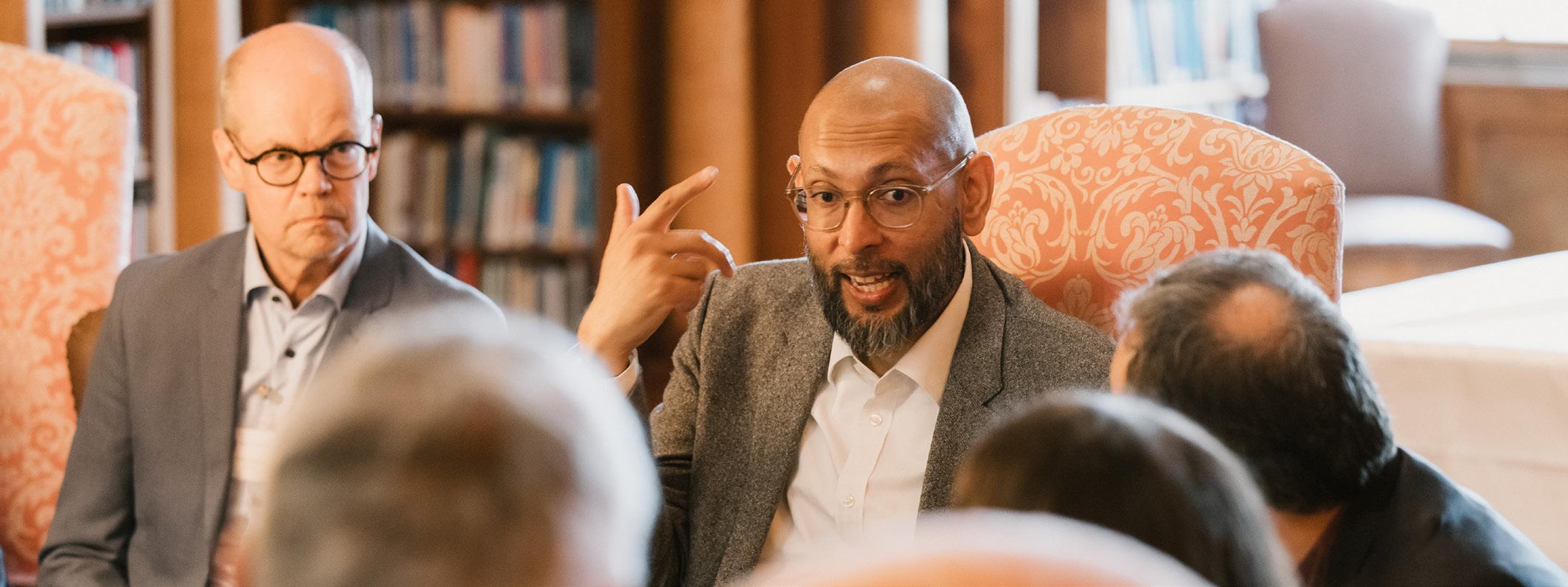
19
PARTICIPANTS * GOVERNMENT
OFFICIALS
Rabih Abouchakra, Managing Director, Office of Strategic Affairs, United Arab Emirates/Canada
Ali Qassim Jawad Al Lawati, President, Royal Academy of Management, Oman
Ahmed Alshamsi, CEO, Emirates Foundation, United Arab Emirates
Vincent Chriqui, Mayor, City of Bourgoin-Jallieu, France
Gwen Dereymaeker, Deputy Director, Policy and Strategy, Western Cape Government, South Africa
Bernie Djonoputro, Chief Executive Officer, Rebana Metropolitan Authority, Indonesia
Eili Lepik, Deputy Strategy Director, Government Office, Estonia
Aaron Maniam, Civil Servant, Singapore government, Singapore
Liz McKeown, Director, Public Policy Analysis, Office for National Statistics, United KingdomCabinet Office, UK
Jaana Tapanainen-Thiess, Secretary General, Government Report on the Future, Prime Minister’s Office, Finland
OFFICIALS FROM MULTILATERAL ORGANIZATIONS
Andrew Blazey, Deputy Head of Public Management and Budgeting, OECD, New Zealand
Josée Touchette Executive Director, Organisation for Economic Co-operation and Development, Canada
OTHER THOUGHT LEADERS
Christian Bason, PhD CEO, Danish Design Center, Denmark
Rupak Chattopadhyay, President and Chief Executive Officer, Forum of Federations, Canada
Olli-Pekka Heinonen Director General, International Baccalaureate, Switzerland / Finland
Sanghyun Lee, Director, Government Affairs and Public Policy, Google, Singapore / Republic of Korea
Penny Low, Founder and President, Social Innovation Park Ltd, Singapore
Antonella Mei-Pochtler, Senior Advisor to the Boston Consulting Group, Antonella MeiPochtler Advisory GmbH, Austria / Italy
Geoff Mulgan, Professor, University College London, United Kingdom
Faisal Naru, Founder / Director, Think Test Do, United Kingdom
Hannah White, Director, Institute for Government, United Kingdom
ORGANIZING PARTNERS
Mohamed Khalifa Alkaabi, Director, Office of Strategic Affairs, United Arab Emirates Derek Alton Community Insights Lead, Apolitical Foundation, United Kingdom / Canada
Kateryna Anselmi Program Manager, Peace and Justice, Salzburg Global Seminar, Austria / Ukraine
Charles Ehrlich, Director, Peace and Justice, Salzburg Global Seminar, Austria
Benjamin Glahn, Deputy CEO and Managing Director, Programs, Salzburg Global Seminar, Austria
Aurore Heugas, Communications Manager, Salzburg Global Seminar, Austria / France
Katarzyna Marszalek, Digital Communications Associate, Salzburg Global Seminar, Austria / Poland
Roula Rbeiz, Principal, Office of Strategic Affairs, United Arab Emirates / Lebanon
Vitus Schlereth, Program Intern, Salzburg Global Seminar, Austria / Germany
Martin Weiss, President and Chief Executive Officer, Salzburg Global Seminar, Austria
Lisa Witter, CEO and Co-Founder, Apolitical Foundation, Germany / United States of America
20 Public Sector Strategy Network: 2023 Annual Strategic Foresight Retreat

21
REPORT AUTHOR
Derek Alton has spent the last 15 years studying and exploring how to build better governments that can build better societies. Before joining Apolitical, Derek worked at the centre of the Government of Canada’s work on digital transformation. Through this work, he has helped develop global communities focused on connecting public servants to each other with the goal of fostering sharing and collaboration.
CONTRIBUTORS
Audrey Plimpton, Communications Associate, Salzburg Global Seminar
Namrata Bhandari, Communications Intern, Salzburg Global Seminar
For more information contact:
Charles E. Ehrlich, Director, Peace and Justice cehrlich@SalzburgGlobal.org
Kateryna Anselmi, Program Manager, Peace and Justice kanselmi@SalzburgGlobal.org
Aurore Heugas, Communications Manager aheugas@SalzburgGlobal.org
For more information visit:
Series SalzburgGlobal.org/go/PublicSector Program SalzburgGlobal.org/go/802-01
22 Public Sector Strategy Network: 2023 Annual Strategic Foresight Retreat
SALZBURG GLOBAL SEMINAR
Salzburg Global Seminar is an independent non-profit organization founded in 1947 to challenge current and future leaders to shape a better world.
Having worked with more than 40,000 Fellows worldwide, we have been at the forefront of global movements for change for more than 75 years, with significant impact on individuals, institutions, and systems.
Whether at our home of Schloss Leopoldskron, online, or in locations around the world, our programs are inclusive, interdisciplinary, international and intergenerational and are designed to provide a global lab for innovation and transformation.
We convene cohorts of passionate changemakers across diverse fields and backgrounds. We develop and curate networks that support collaboration, share innovations with new audiences and expand our impact by working with partners around the globe.
We are supported by a combination of institutional partnerships, generous individual donations and revenue generated from our social enterprise, Hotel Schloss Leopoldskron.
PUBLIC SECTOR STRATEGY NETWORK
The Public Sector Strategy Network equips governments to tackle complex challenges through improved foresight, innovation and implementation. Co-created with senior leaders from around the world, it is building a mutually-supportive coalition of individuals and institutions on the frontline of digital, financial and societal disruption, promoting effective public leadership and strategic communication. For more info. please visit: www.SalzburgGlobal.org
23 23 Publication Name
© 2023 Salzburg Global Seminar. All rights reserved.















